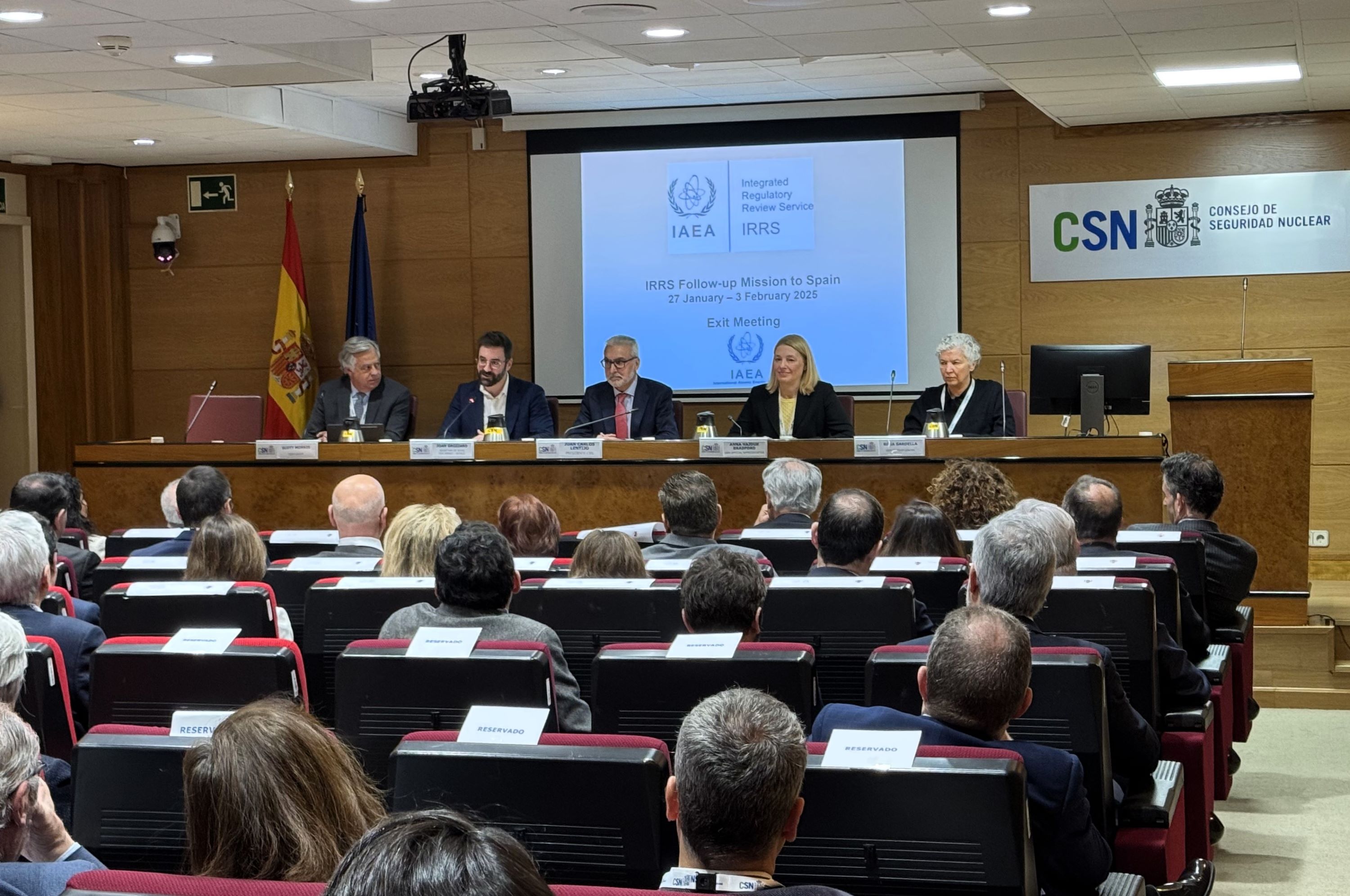Contenido principal
2025
IAEA Follow-up Mission Recognizes Spain’s Continued Commitment to Improve Nuclear and Radiation Safety
An International Atomic Energy Agency (IAEA) team of experts said Spain showed a strong commitment to nuclear and radiation safety, and confirmed that it has successfully enhanced its regulatory framework, fully implementing recommendations made during the Agency’s 2018 mission
Read on IAEA website

An IAEA team of experts today completed a follow-up review of Spain’s regulatory framework for nuclear and radiological safety
The Integrated Regulatory Review Service (IRRS) follow-up mission, which took place from 27 January to 3 February at the request of the Government of Spain was hosted by the Nuclear Safety Council (CSN), the Ministry for Ecological Transition and Demographic Challenge (MITECO), the Ministry of Health (MoH), and the Ministry of Interior (MoI). Its purpose was to review progress on the recommendations and suggestions identified in the initial IRRS mission in 2018, except for those covering the management of radioactive waste, spent fuel, and decommissioning. These will be covered by an upcoming Integrated Review Service for Radioactive Waste and Spent Fuel Management, Decommissioning and Remediation (ARTEMIS) follow-up mission, which is expected to take place later in 2025.
IRRS missions are designed to strengthen the effectiveness of the national nuclear and radiation safety regulatory infrastructure, based on IAEA safety standards and international good practices, while recognizing the responsibility of each country to ensure nuclear and radiation safety.
Spain utilizes nuclear and radiation technologies for energy production, medical applications, industry, and research. The country has seven operating nuclear power reactors, producing around 20% of its electricity. Three nuclear power plants are in permanent shutdown, in different stages of decommissioning and closure.
Most of the reactor sites have interim spent fuel storage facilities, and Spain has one disposal facility for very low, low and intermediate level radioactive waste.
The mission team identified notable achievements by CSN in the following areas:
- Developing a Human Resource Plan, including a systematic approach to training for all staff.
- Strengthening the Safety Culture of the CSN.
- Establishment of a National Radon Action Plan.
- Ensuring CSN’s effective collaboration with the Autonomous Communities.
Two good practices were also highlighted:
- The Digital Radiation Passbook, a digital platform created by CSN that provides users with real time dose data, reduces the need for manual data input, and enables the regulator to conduct real-time statistical analyses; and
- A centralised digital dosimetry system, provided by the CSN, to be used during emergencies for real time radiation dose monitoring of emergency workers of all off-site response organizations.
The IRRS team suggested that Spain establish guidance documents on the content of the information about possible radiation risks delivered to the public by authorized parties as required by legal provisions, in accordance with a graded approach.
Juan Carlos Lentijo, CSN President, said: "The IRRS follow-up mission reinforces Spain's commitment to nuclear safety and radiation protection. This process is a valuable tool to work on robust and future-proof safety systems, where excellence continues to be the highest priority."
The final mission report will be provided to the Government in about three months.
IAEA Safety Standards
The IAEA Safety Standards provide a robust framework of fundamental principles, requirements and guidance to ensure safety. They reflect an international consensus and serve as a global reference for protecting people and the environment from the harmful effects of ionizing radiation.
As part of its review, the IRRS team – comprised of four regulatory experts from France, Germany, Switzerland, and the United States of America, as well as four IAEA staff members – conducted interviews and discussions with CSN and MITECO staff and representatives from the MoH and MoI. The team reviewed the actions taken by Spain to address the recommendations and suggestions made in 2018 and found that 12 recommendations and 20 suggestions have been adequately addressed. As a result, they have been either fully closed or closed on the basis of progress made and confidence in effective completion in due time.
“The IRRS team was very impressed with the high degree of commitment and professionalism demonstrated by our Spanish counterparts,” said Scott Morris, Regional Administrator for the U.S. Nuclear Regulatory Commission, and Team Leader for this mission. Their focus on continuous improvement of the legal and regulatory framework for nuclear and radiological safety in Spain is commendable.”
Access all the images from the IRRS Follow-up Mission through this album


